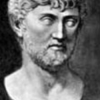Lucretius

Lucretius
Titus Lucretius Caruswas a Roman poet and philosopher. His only known work is the epic philosophical poem De rerum natura about the tenets and philosophy of Epicureanism, and which is usually translated into English as On the Nature of Things...
NationalityRoman
ProfessionPoet
air fields gentle
Confess then, naught from nothing can become, Since all must have their seeds, wherefrom to grow, Wherefrom to reach the gentle fields of air.
elements tools divine
Meantime, when once we know from nothing still Nothing can be create, we shall divine More clearly what we seek: those elements From which alone all things created are, And how accomplished by no tool of Gods.
strong men would-be
I own with reason: for, if men but knew Some fixed end to ills, they would be strong By some device unconquered to withstand Religions and the menacings of seers.
law sky names
I prove the supreme law of Gods and sky, And the primordial germs of things unfold, Whence Nature all creates, and multiplies And fosters all, and whither she resolves Each in the end when each is overthrown. This ultimate stock we have devised to name Procreant atoms, matter, seeds of things, Or primal bodies, as primal to the world.
blow order should-have
Certainly it was no design of the atoms to place themselves in a particular order, nor did they decide what motions each should have. But atoms were struck with blows in many ways and carried along by their own weight from infinite times up to the present.
prayer wind sea
When the supreme violence of a furious wind upon the sea sweeps over the waters the chief admiral of a fleet along with his mighty legions, does he not crave the gods' peace with vows and in his panic seek with prayers the peace of the winds and favouring breezes. Nonetheless, he is caught up in the furious hurricane and driven upon the shoals of death.
mean thinking flames
Tempests, and bright lightnings, are to be sung; their nature is to be told, and from what cause they pursue their course; lest, having foolishly divided the heaven into parts, you should be anxious as to the quarter from which the flying flame may come, or to what region it may betake itself; and tremble to think how it penetrates through walled enclosures, and how, having exercised its power, it extricates itself from them. Of which phenomena the multitude can by no means see the causes, and think that they are accomplished by supernatural power.
religious mean men
Did men but know that there was a fixed limit to their woes, they would be able, in some measure, to defy the religious fictions and menaces of the poets; but now, since we must fear eternal punishment at death, there is no mode, no means, of resisting them.
sea calm never-trust
Never trust the calm sea when she shows her false alluring smile.
lasts firsts senses
These [the senses] we trust, first, last, and always.
eye men animal
First, then, I say, that the mind, which we often call the intellect, in which is placed the conduct and government of life, is not less an integral part of man himself, than the hand, and foot, and eyes, are portions of the whole animal.
easier snares
It's easier to avoid the snares of love than to escape once you are in that net.
life given lease
To none is life given in freehold; to all on lease.
beautiful strong men
Beauty and strength were, both of them, much esteemed; Then wealth was discovered and soon after gold Which quickly became more honoured than strength or beauty. For men, however strong or beautiful, Generally follow the train of a richer man.